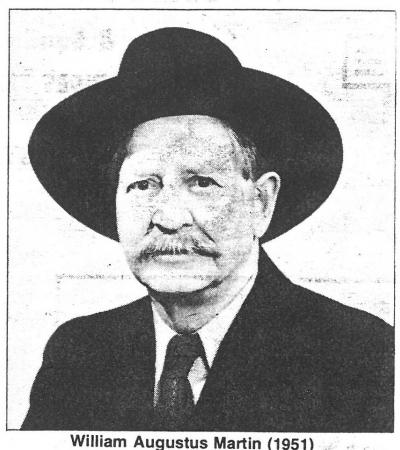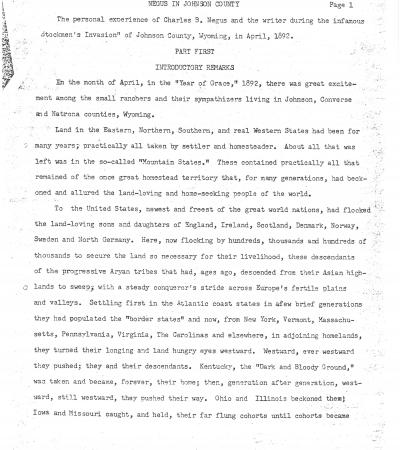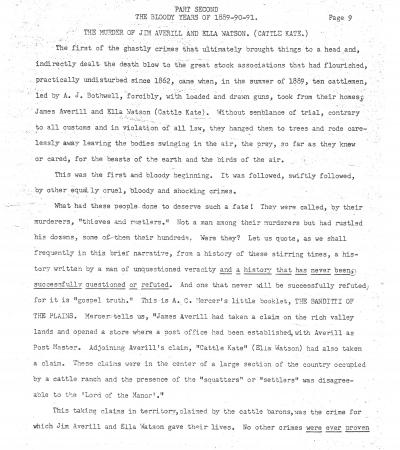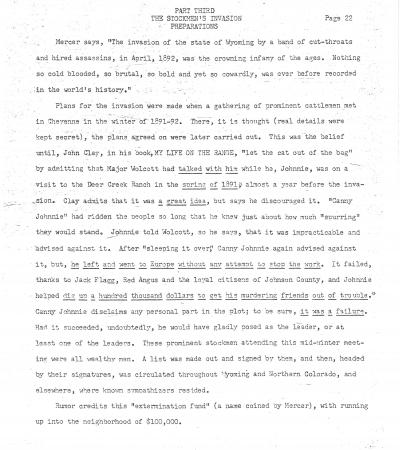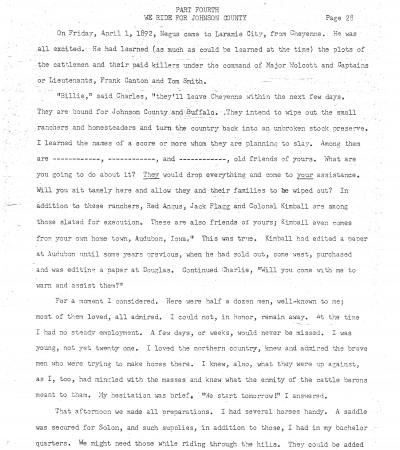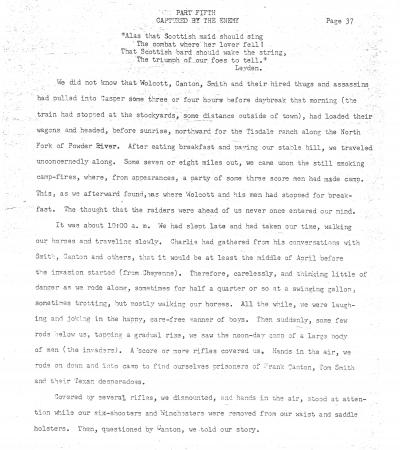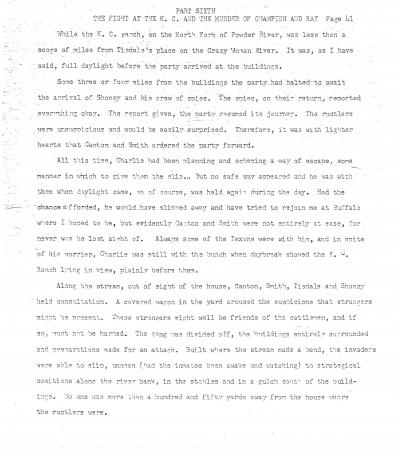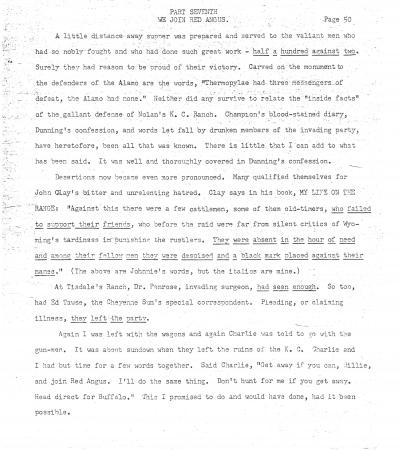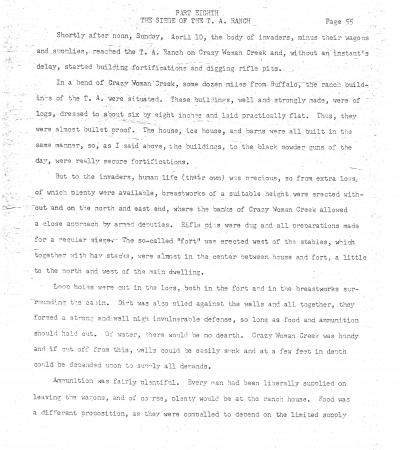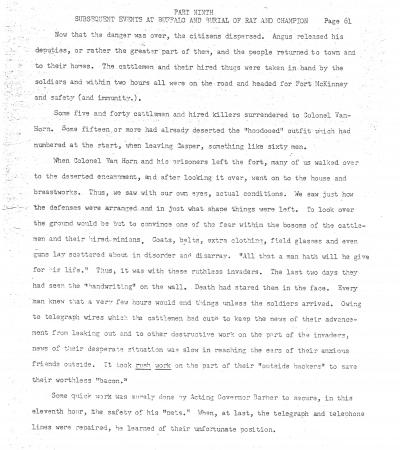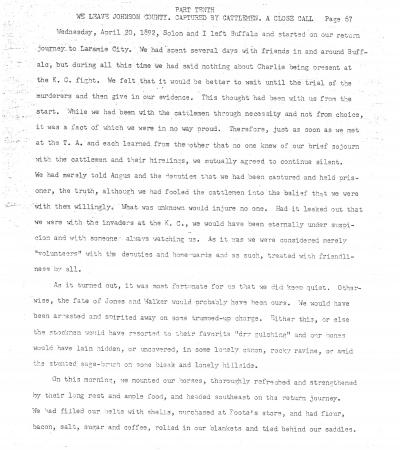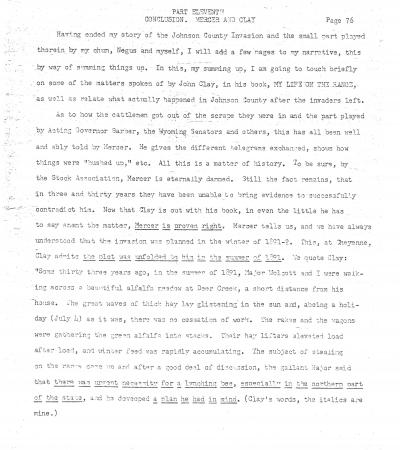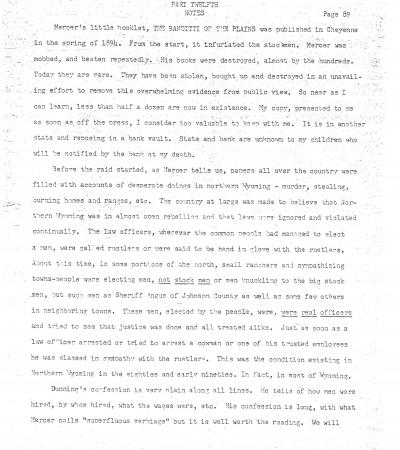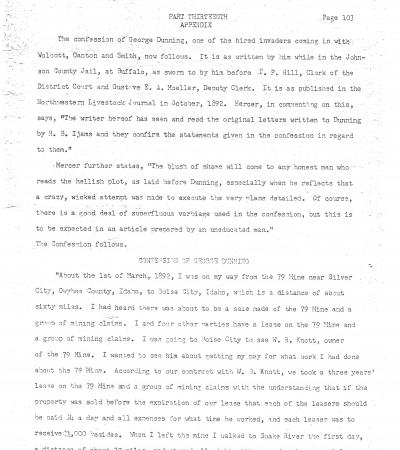William Augustus Martin (1871-1955) came to Wyoming Territory around 1887. He engaged in various jobs, eventually becoming a guard at the Wyoming Territorial Prison in Laramie. Martin wrote of escapades he and his friend Charles B. Solon (Negus) experienced during the April 1892 Johnson County War. The unpublished manuscript was written in 1928. Martin compiled further notes in 1940. His reminiscences reflect his sympathies for the small homesteaders rather than the large cattlemen who organized and participated in the Invasion. Martin married Birdie Blanche Gooding in Laramie in 1896 and in 1899 the couple moved to Waverly, Colorado. The American Heritage Center’s copy of Martin’s manuscript is a copy of the one held Fort Collins Public Library in Fort Collins, Colorado.
"Waverly Farmer 'poet of the plains'" by Charlene Tresner, Triangle Review, Fort Collins, Colorado, ca. 1980
Article by a Fort Collins historian about the lift of William Augustus "Billy" Martin.
Part First: Introductory Remarks
Martin provides a grand sweep of the settling of the U.S. by European Americans and brings his focus to the struggle between large and small cattle outfits. He casts the struggle as one between the cattlemen who had long held grazing land through squatters' right and small ranchers who used government claims to lawfully acquire land and water rights.
Part Second: The Bloody Years of 1889-90-91 - The Murder of James Averill [sic] and Ella Watson (Cattle Kate)
Martin writes that from 1889 to 1891, Wyoming's large cattlemen and their allies murdered small ranchers James Averell, Ella Watson (more here), Tom Waggoner, Orley E. Jones, and John A. Tisdale and attempted to murder Nate Champion and Ross Gilbertson (more here).
Part Third: The Stockmen's Invasion Preparations
Sticking to Mercer's Banditti of the Plains, Martin lays out the planning involved in the Invasion. Compare to William C. Irvine's letters to Charles B. Penrose in this collection (see ah09626_106-126 and ah09626_138-149). Martin also mentions John Clay's involvement (more here), along with Clay's book My Life on the Range (1924).
Part Fourth: We Ride for Johnson County
In detail Martin describes the multi-day journey he and his friend Charles B. Solon (or Negus) took in early April 1892 from Laramie to Buffalo to warn their friends of the coming Invasion. He includes mention of ranches and people they passed along the way. Part four ends as they camp overnight in Casper.
Part Fifth: Captured by the Enemy
Martin and Solon blunder into the Invaders' camp near Casper. The two pretend to be supportive of the Invaders' mission and ride with them to the Tisdale ranch. Any travelers the met along the way were sworn to secrecy before being allowed to continue. Once at Tisdale's ranch to reconnoiter, Frank Canton, who still believes Martin and Solon are allies, returns their guns to join the attack for pay. Martin is assigned to remain guard with the teamsters while Solon is included with the group planning to dynamite the KC Ranch where several alleged cattle rustlers were staying.
Part Sixth: The Fight at the K. C. and the Murder of Champion and Ray
Solon seeks to escape from the Invaders, but can find no way to do so. A covered wagon with unknown occupants outside the KC ranch cabin as well as harsh daylight prevent the Invaders' plan to dynamite the cabin. Instead the Invaders decide to attack. Martin recounts the events of attack on Nate Champion and others in the cabin including Nick Ray and trappers Ben Jones and William Walker and the attempted killing of Jack Flagg and his stepson. Martin quotes from Chicago Herald reporter Sam T.
Part Seventh: We Join Red Angus
Martin writes that, after Champion's death, desertions began from the Invaders, including Dr. Charles B. Penrose and Cheyenne Sun special correspondent Ed Towse. Still looking to escape, Martin and Solon remain with the Invaders as the group proceeds to Buffalo but makes a detour to the TA Ranch upon learning that Buffalo residents have gathered an opposing force. Solon is able to escape and joins Jack Flagg's forces while Martin is still with the Invaders' wagons. The two reunite at the TA Ranch, which is now surrounded by the opposition forces.
Part Eighth: The Siege of the T. A. Ranch
The Invaders and the opposing force conduct a seige complete with breastworks and rifle pits. Martin states that the Invaders were unconcerned due to the support of powerful political friends. But the Invaders were fighting amongst themselves with Tom Smith and Frank Canton attempting to maintain control. Martin and Solon now join the opposing force. Shooting continued for two days (April 11 & 12) with the opposing force building a "Go Devil" when soldiers arrived.
Part Ninth: Subsequent Events at Buffalo and Burial of Ray and Champion
The Invaders surrender to U.S. Army Colonel Van Horn and within two hours are safely escorted to Ft. McKinney. With disdain, Martin comments that Wyoming's political faction ensured the Invaders' safety. Martin praises Buffalo resident Robert Foote for rousing residents to repel the Invaders. The burial of Champion and Ray is described in quotes from Mercer's Banditti of the Plains. Martin notes that the sight of Champion's and Ray's bodies inflamed Buffalo residents and copies of Champion's diary were passed around. See William C. Irvine's letter to Charles B.
Part Tenth: We Leave Johnson County. Captured by Cattlement. A Close Call
Martin and Solon visit friends in Buffalo before returning to Laramie, but keep secret their unforeseen involvement in the Invasion. Martin remarks on the wisdom of secrecy, writing the Invaders could have them arrested on trumped up charges, such as the fate of Ben Jones and William Walker. Martin and Solon begin the trip back to Laramie, stopping overnight at the ruins of the KC Ranch. They are accosted by Invaders' allies and almost hung as rustlers, but saved when one of the party vouches for Martin. The pair are released after taking oaths not to reveal names.
Part Eleventh: Conclusion. Mercer and Clay
Martin compares the truthfulness of Asa Mercer's book Banditti of the Plains (1894) with John Clay's book My Life on the Range (1924) regarding the Johnson County War and asserts that Mercer is truthful and Clay is not. The lack of truth in Clay's account, according to Martin, is because it shades the events to favor the large cattle owners.
Part Twelfth: Notes
Divided into eight parts, Martin provides additional details as he remembers them regarding the killings and burials of Champion and Ray; capture of Invader R. M. Allen; shooting of Ben Jones; the Invaders referring to he and Solon as "The Kids;" Chicago Herald reporter Sam Clover; Champion's resistance delaying the Invaders' plans to attack in Buffalo; the coming of soldiers who arrested the Invaders; and more.
Part Thirteenth: Appendix
Martin here includes the confession of George Dunning, a hired hand for the Invasion, written while Dunning was in jail in Buffalo following the Invasion. On Oct. 14, 1892, Asa Mercer included the 44-page longhand statement word-for-word in his Northwestern Live Stock Journal. The confession included Invasion planning and events and implicated most Wyoming participants, in particular the expedition's planners and leaders, especially H. B. Ijams. Dunning's confession appeared as an appendix in Mercer's book Banditti of the Plains published in 1894. (Page 138 missing)
